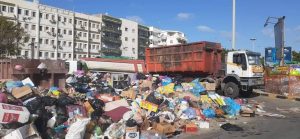By Sami Zaptia.

London, 7 October 2019:
Libya’s National Meteorological Centre warned yesterday of the impending environmental and health pollution cost of uncollected garbage in Greater Tripoli.
It said that in view of the continued accumulation of garbage on most of the streets and squares of Tripoli for a large number of the days, and the harm and damage it may cause to citizens and the environment, the National Meteorological Centre, in line with its responsibilities, warned all relevant authorities to assume their responsibilities, in view of the forecasted rain in the municipalities of Greater Tripoli from Tuesday.
It warned that the resulting environmental and health pollution caused by rainfall may cost twice the cost of prevention and could leave a lasting impact.
It feared that sewage channels could be blocked, and roads closed which could lead to the obstruction in all aspects of the daily life of citizens and institutions if mitigating measures are not taken now. It urged that the next 72 hours should be used to avoid these consequences.
It will be recalled that Tripoli has been suffering a garbage crisis with municipalities failing to clear roadside hills of garbage. This has created anger amongst residents which pressured the Municipality of Central Tripoli into publishing the volumes of rubbish it is collecting.
For example, on 1 October the Municipality of Central Tripoli reported that during a four-day period from 26 to 29 September it had collected a total of 1,372 tons of rubbish.
On Friday 4 October it reported that it had collected another 300 tons of garbage. It said that it had done this despite difficulties in access to dumping sites and truck drivers.
It warned against the increasing ‘‘phenomenon of burning garbage’’ which it said was ‘’unacceptable and unnecessary’’ and contrary to Libyan law. It assured the public that it was removing the garbage as fast as it could.
Tripoli has always had issues with rubbish collection, with the authorities alternating over the years and decades between subcontracting collection to the private sector and allowing the state Hygiene Company doing the collection.
However, lack of salary payment, absenteeism from work, over-employment and lack of investment have dodged the service for decades.
Since the Tripoli fighting has erupted, however, the authorities say that main cause of the problem is that the main garbage dumping site at Sidi Sayeh is closed due to it being in the battle front in Tripoli’s war, and the transition site at Bu Sleem is now reportedly full. Equally, with the spread of arms and increased local power and NIMBY tendencies, no other Municipality wants Tripoli’s main rubbish dump located in their neighbourhood.
The problem is crying out for recycling, either by having Libya’s rubbish processed and exported or being recycled and upcycled domestically. The fighting and lack of security, however, makes this option unlikely in the very short term.
https://www.libyaherald.com/2019/10/02/municipality-of-central-tripoli-collects-1372-tons-of-rubbish-off-streets-over-four-days/
https://www.libyaherald.com/2019/07/17/eastern-libya-invites-bot-offer-from-german-company-to-recycle-waste-for-energy-production/







